Wayfinder Wisdom
In this series each post focuses on a specific aspect of camp. It is our attempt to share some of the knowledge we have accumulated in more than a decade of LARPing.
One Shot Adventures
One Shot Adventures
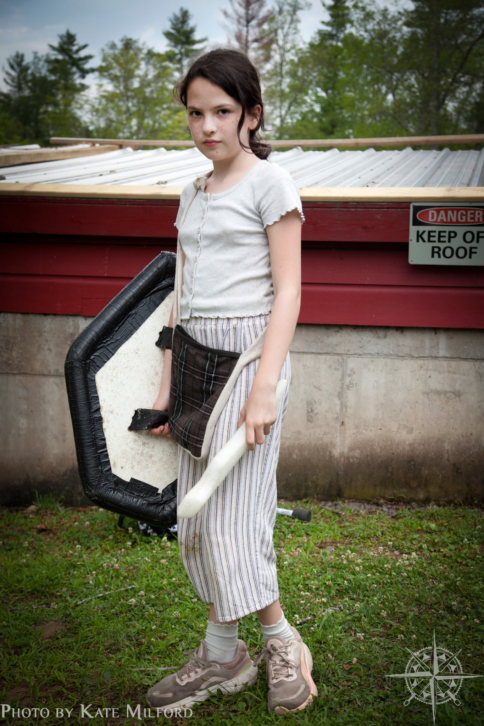 I have previously written here about our campaign style play and the linked worlds we inhabit and return to. I have personally had great play experiences in our campaigns, deep and meaningful connections to characters I have been able to reunite with over periods of months, years, or, with our recent resurgence of Finals games, even decades. This type of play is wonderful and deep in a very special way, but as anyone who has played a long term roleplaying campaign in any format is likely to be familiar with, campaign play is dependent upon an investment of time in a character and story that it can become very difficult to let go or pivot away from that character should they die. This, along with some logistical and creative realities, is a big reason why the majority of the Adventure Games that we run at Wayfinder are One Shots. Singular visits to a world and a character that we will never physically return to. This singular imagined reality, and the very temporary and short lived nature of it, provides players with an important understanding of their characters, the stakes and expectations within the game, and the stories we are able to tell.
I have previously written here about our campaign style play and the linked worlds we inhabit and return to. I have personally had great play experiences in our campaigns, deep and meaningful connections to characters I have been able to reunite with over periods of months, years, or, with our recent resurgence of Finals games, even decades. This type of play is wonderful and deep in a very special way, but as anyone who has played a long term roleplaying campaign in any format is likely to be familiar with, campaign play is dependent upon an investment of time in a character and story that it can become very difficult to let go or pivot away from that character should they die. This, along with some logistical and creative realities, is a big reason why the majority of the Adventure Games that we run at Wayfinder are One Shots. Singular visits to a world and a character that we will never physically return to. This singular imagined reality, and the very temporary and short lived nature of it, provides players with an important understanding of their characters, the stakes and expectations within the game, and the stories we are able to tell.
LARP is a chance to explore identity. One Shots turn this exploration from a deep dive into a buffet. If you play in three Adventure Games, which in one summer you could achieve with three weeks of camp or just by attending Overnight 4 where we run three fully separate Games in three fully distinct worlds, you are given the chance to play a minimum of three characters. When you have that kind of opportunity, it shifts the dynamic when it comes to risk aversion. Not every hero survives their story. Being in a One Shot often gives us the chance to play out the kinds of scenes that we may shy away from in campaign play. The death of a character who you have spent months or years playing can be a hard thing to stomach, from the personal attachments we form to the very real time investment that cannot be instantly recreated in the next character. One Shots free us from that. In the words of Sparrow, a long time camper of ours, “I love the feeling of sweet desperation. You get these small little bite sized pockets of beauty and bonding, and I usually walk into these games knowing most of my loved ones in the game will die. I think it creates this sweet vibe that I love!” The short nature of the game opens the players to options that may normally feel scary, unavailable, or too heavy to consider.
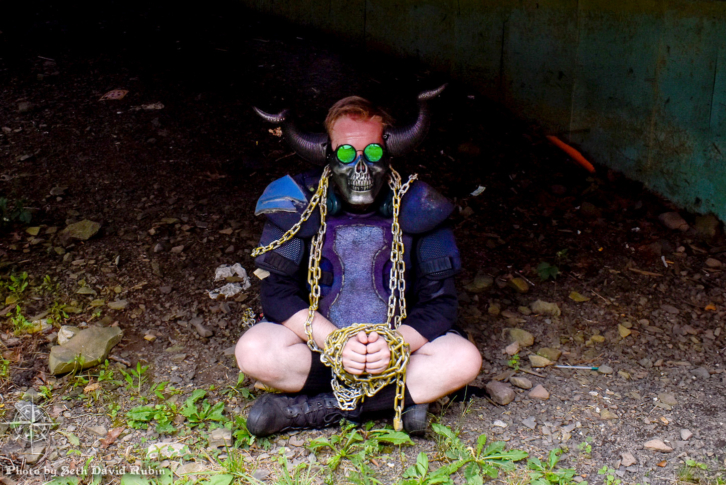 We are able to be the noble and self sacrificing hero, the one left holding back the forces of evil as our friends escape. We can play the fool, and walk knowingly into a trap that will mean our end. We can experience in real time being the one who is lost, the one who is mourned by those left behind. Having personally survived my own character’s funeral on more than one occasion, I can tell you that it is a powerful and lasting experience. With so little time for our characters to live regardless of our choices, we are given the chance to take chances and risk it all. One Shot play gives us the gift of all of these things that can be so terrifying, whether in campaign play or in their very real and permanent occurrences in real life. In the words of another of our campers, Eloise, “I really enjoy the temporary parts of it, since they aren’t very long. You are only seeing a part of the story of your character, not the whole book. On the out of character side you make connections in-game with people you might’ve never connected to otherwise because you’re not afraid to explore, no matter how poorly it goes, it’ll just be temporary.” The scope of choices you can make and your opportunities to connect with people are magnified. You are not with the same group of players every time. You have the chance to hide from demons with one group of players, and then turn around in your next Adventure Game and fight to overthrow the kingdom. The bonds you build last. The characters and stories don’t have to.
We are able to be the noble and self sacrificing hero, the one left holding back the forces of evil as our friends escape. We can play the fool, and walk knowingly into a trap that will mean our end. We can experience in real time being the one who is lost, the one who is mourned by those left behind. Having personally survived my own character’s funeral on more than one occasion, I can tell you that it is a powerful and lasting experience. With so little time for our characters to live regardless of our choices, we are given the chance to take chances and risk it all. One Shot play gives us the gift of all of these things that can be so terrifying, whether in campaign play or in their very real and permanent occurrences in real life. In the words of another of our campers, Eloise, “I really enjoy the temporary parts of it, since they aren’t very long. You are only seeing a part of the story of your character, not the whole book. On the out of character side you make connections in-game with people you might’ve never connected to otherwise because you’re not afraid to explore, no matter how poorly it goes, it’ll just be temporary.” The scope of choices you can make and your opportunities to connect with people are magnified. You are not with the same group of players every time. You have the chance to hide from demons with one group of players, and then turn around in your next Adventure Game and fight to overthrow the kingdom. The bonds you build last. The characters and stories don’t have to.
 Despite the modern reality of franchise films, not every story needs a sequel. Sometimes, the world can be saved for good. One Shots, as they exist as complete stories, provide us with a kind of permanent resolution that it can be difficult to find in continued play experience. There is no reopening of old wounds. There is no return of a villain or a problem. The world has been saved from the demons who sought to destroy it, full stop. That kind of finality is satisfying. The world is safe. Our sacrifices mattered. The world we played in can turn on, no new problems on the horizon. It is useful and important to tell stories that mirror life, with a world that is complex and changing, never fully saved and never done improving. It is also deeply important to remind ourselves that we can win battles. We can triumph. We can overcome. We can die, and mourn, and love and fight all in the course of a few hours. Each one of us contains an endless number of characters. One Shots give us the chance to give more of them a chance to see a little daylight. Not every hero has to fight in endless battles. Sometimes, we can simply stay safe.
Despite the modern reality of franchise films, not every story needs a sequel. Sometimes, the world can be saved for good. One Shots, as they exist as complete stories, provide us with a kind of permanent resolution that it can be difficult to find in continued play experience. There is no reopening of old wounds. There is no return of a villain or a problem. The world has been saved from the demons who sought to destroy it, full stop. That kind of finality is satisfying. The world is safe. Our sacrifices mattered. The world we played in can turn on, no new problems on the horizon. It is useful and important to tell stories that mirror life, with a world that is complex and changing, never fully saved and never done improving. It is also deeply important to remind ourselves that we can win battles. We can triumph. We can overcome. We can die, and mourn, and love and fight all in the course of a few hours. Each one of us contains an endless number of characters. One Shots give us the chance to give more of them a chance to see a little daylight. Not every hero has to fight in endless battles. Sometimes, we can simply stay safe.
Written by Judson Easton Packard July 2024
New blog post: Mailbag
Mailbag
We wanted to know what you! Our readers were interested in knowing more about. Here are the first ( of hopefully many) questions answered. Do you have a question you want answers too? Email them to Trine@Wayfinderexperience.com and check back here!
1.I’ve been to a couple different Larp camps/games, and a lot of them run more like DND than improv. What made you guys decide to run your system the way that you do? And secondly, who invented said system?
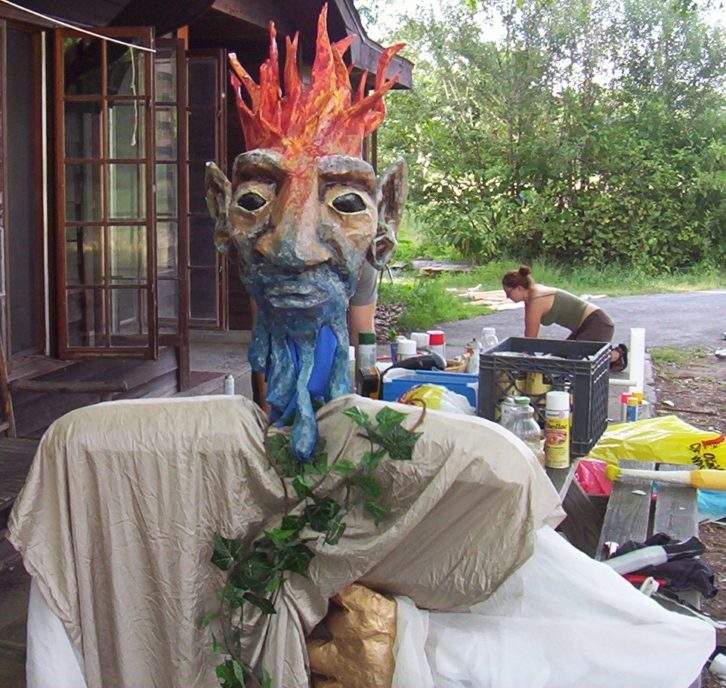 Wayfinder grew off a similar organization called Adventure Game Theater, which has since been absorbed into Wayfinder. Our programming grew directly from the systems and work that AGT did. Many parts of our system were built around DND spells and other systems that people were familiar with, but as with many LARPs our systems have evolved to reflect the people in the community and the ways in which we play our games. The Adventure Game as a LARP system started in 1986 (before Magic the Gathering for some nerd street cred) and has been being updated, tweaked, and adapted ever since. There is no one person who created our system (which contains a base system of 5 classes and over 100 abilities, with other auxiliary powers and classes available for use in less standard game settings and several variations on improv magic instead of our class based system). There have been a number of people who have worked on it over the years. The current system that is in play was largely developed and updated by Conor Gillespie, Griffin Johnston, Jack Covell, and Brennan Lee Mulligan in the mid aughts, but it has since been updated by our administrative staff and is undergoing regular updates and reworkings to keep it feeling fresh and in line with the way that games our played today!
Wayfinder grew off a similar organization called Adventure Game Theater, which has since been absorbed into Wayfinder. Our programming grew directly from the systems and work that AGT did. Many parts of our system were built around DND spells and other systems that people were familiar with, but as with many LARPs our systems have evolved to reflect the people in the community and the ways in which we play our games. The Adventure Game as a LARP system started in 1986 (before Magic the Gathering for some nerd street cred) and has been being updated, tweaked, and adapted ever since. There is no one person who created our system (which contains a base system of 5 classes and over 100 abilities, with other auxiliary powers and classes available for use in less standard game settings and several variations on improv magic instead of our class based system). There have been a number of people who have worked on it over the years. The current system that is in play was largely developed and updated by Conor Gillespie, Griffin Johnston, Jack Covell, and Brennan Lee Mulligan in the mid aughts, but it has since been updated by our administrative staff and is undergoing regular updates and reworkings to keep it feeling fresh and in line with the way that games our played today!
2. I know this isn’t a question you can as easily answer on your own, but I love to hear what people’s favorite adventure games are and why.
I can’t speak to everyone’s favorite games, but my two favorite games growing up were the original run of Finals and the 80’s Horror Game from Decades camp. The first Finals gave me, personally, a new experience of being central to a lot of the flow of the game and getting to be a part of big scenes, while delivering an intense and emotional storyline. Everyone was very invested in the game and the world was fun and exciting. I loved getting to play Solomon, get dragged along behind Tiriel all night, and getting to be an accessory to the (almost) end of the world. Getting to replay that and play Tiriel the second time was a very special game for me, and one of the rare chances to have a new experience in an Adventure Game as someone who has been doing this for over two decades. The 80’s Horror Game was just peak camp (both the place and the genre). The game was scary and ridiculous and fun. I got to be the Apprentice for it so I had a peek under the hood as to how everything would work. We spent the night running from Clown Zombies (Clombies for short) and one Clombear (Clown Zombie Bear). It was simultaneously one of the funniest and scariest games I have ever played and will stay with me forever (it was a big inspiration when Corrie and I were writing Prom of the Living Dead a few years ago!).
3. Why do you think sword games became such a big part of Wayfinder as a whole, when in reality, we don’t even use them nearly as much in game?
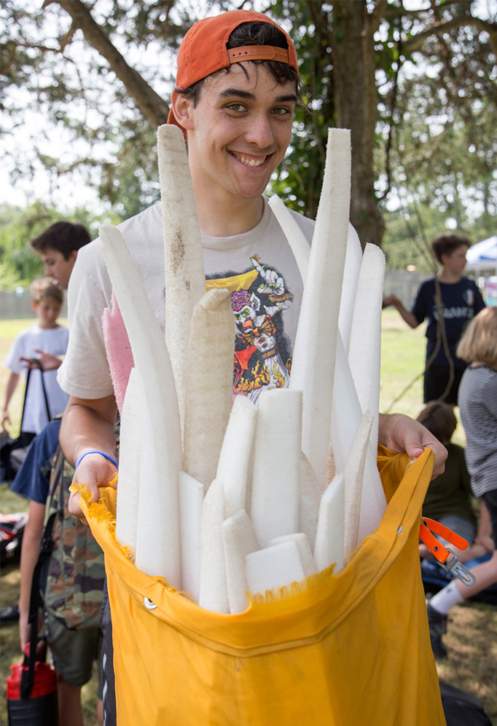 The swords are central to what we do. It is the easiest way to grasp LARP for an outsider. It can be hard to take on a character, to tell a story, to invest in the small details of a world that isn’t your own, but it is very easy to understand that getting hit with a sword is bad and getting a chance to swordfight is fun. On top of the access to different types of play, swords are a hugely appealing thing to many participants (new, returning, young, and old). There aren’t that many chances to safely hit each other with things or to simulate battle. As purely an experience, it’s a fun and fairly unique one (not a ton of drop in LARPs that are easily accessible for kids). For many of us who want to be active but are not necessarily the most athletic, it provides the chance to get to play in some athletics with some leveling in the reality of there’s always the chance to fight your way out. Add on top the ability to scream and die together, live out the epic battles you’ve seen or read in so many books, movies, and video games, and the list of reasons to love swords stretches on almost endlessly.
The swords are central to what we do. It is the easiest way to grasp LARP for an outsider. It can be hard to take on a character, to tell a story, to invest in the small details of a world that isn’t your own, but it is very easy to understand that getting hit with a sword is bad and getting a chance to swordfight is fun. On top of the access to different types of play, swords are a hugely appealing thing to many participants (new, returning, young, and old). There aren’t that many chances to safely hit each other with things or to simulate battle. As purely an experience, it’s a fun and fairly unique one (not a ton of drop in LARPs that are easily accessible for kids). For many of us who want to be active but are not necessarily the most athletic, it provides the chance to get to play in some athletics with some leveling in the reality of there’s always the chance to fight your way out. Add on top the ability to scream and die together, live out the epic battles you’ve seen or read in so many books, movies, and video games, and the list of reasons to love swords stretches on almost endlessly.
4. Who is the REAL Horatio Wayfinder?
Privacy, especially in today’s digital age, is a difficult thing to attain and an easy thing to destroy. As such, I can’t speak today to the REAL Horatio Wayfinder, our mysterious benefactor, but I can say that the people who are putting the time and effort into making these spaces the safe and fun realities that they are have all of their hearts and minds invested in our campers and the spaces that we build for them. It’s not the same people every time. It’s not the same story every time. It’s not the same Adventure every time. It is an act of love every time though, and does Horatio, or anyone, owe us anything more than that?
Written by Judson Easton Packard May 2024
Campaign Style Play
Campaign Style Play
At Wayfinder, the majority of our Adventure Games are written as One Shots. We imagine worlds that we visit only once, stepping into them to shape the course of monumental events, before moving onto the next, carrying those stories and characters only in our memories. We do, on occasion, delve deeper into worlds and engage in campaign style play, returning to the same world across multiple camps or One Day events and allowing player choices, and the stories that they shape, to run their course.
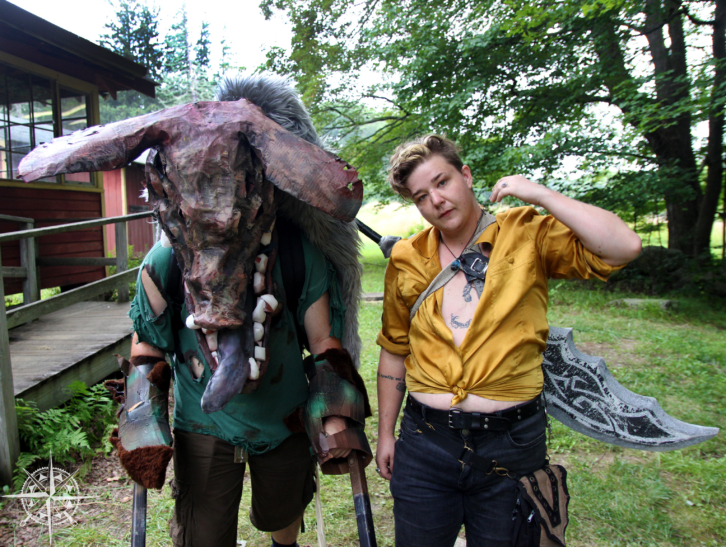 Campaign play allows us to spend more time with a particular character and story line, to carry our characters forward through a series of events and construct singular narratives around the different stories they find themselves at the center of. Characters always provide us a reflection of ourselves, a vision into another way that we could be and interact with those around us. Returning to a character can feel like coming home to yourself. Characters can share a lot with us, they may be good, they may be evil, but whoever they are, the distance they provide from our everyday selves brings a newness into the body that can be very welcoming. The longer you play as a particular character, the more of that character’s life you will hold in your memory.
Campaign play allows us to spend more time with a particular character and story line, to carry our characters forward through a series of events and construct singular narratives around the different stories they find themselves at the center of. Characters always provide us a reflection of ourselves, a vision into another way that we could be and interact with those around us. Returning to a character can feel like coming home to yourself. Characters can share a lot with us, they may be good, they may be evil, but whoever they are, the distance they provide from our everyday selves brings a newness into the body that can be very welcoming. The longer you play as a particular character, the more of that character’s life you will hold in your memory.
We often talk about the opportunity for self-exploration that is afforded to us through Live Action Role-Play (LARP). One Shot play doesn’t afford us less of this, but it is simply different. For years, our One Day Adventure Games have offered linked storylines, allowing players to continue the same character across multiple games for as long as that character survives. It provides us with a personal stake and investment in a storyline that is different than may be offered to us anywhere else. Anyone who’s played in a tabletop campaign may have experienced this kind of character play. I have found that there is a difference when I am physically embodying the character. The stakes feel more personal, the intensity more immediate, and the joys more personal.
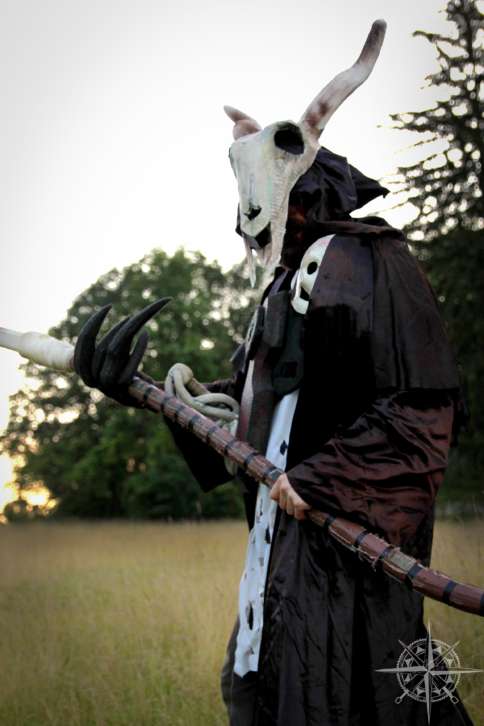 Last summer we returned to having linked Campaign style Adventure Games as a part of our summer offerings. Over the course of two weeks of camp players were introduced to a world that our staff had collaborated to build the mythology of. People built characters that had to face off against an ancient evil, a lich who had found a way to once again crawl out of death. In our first week characters fought an increasingly desperate battle to stem the tides of undeath, to hold this evil back before it swallowed the world. They were successful, but at the price of a large number of their own, including some heroes they had grown to care about. In the second week we opened with a funeral for one of those characters who had passed. Campers and staff alike gave impromptu elegies that brought a solemn warmth to the scene, and made it all the more upsetting when the character rose again possessed by the lich. Playing in the same world over the course of multiple weeks, made everything feel more familiar, more lived in. Campers were able to share stories and lore with one another. The world became truly collaborative.
Last summer we returned to having linked Campaign style Adventure Games as a part of our summer offerings. Over the course of two weeks of camp players were introduced to a world that our staff had collaborated to build the mythology of. People built characters that had to face off against an ancient evil, a lich who had found a way to once again crawl out of death. In our first week characters fought an increasingly desperate battle to stem the tides of undeath, to hold this evil back before it swallowed the world. They were successful, but at the price of a large number of their own, including some heroes they had grown to care about. In the second week we opened with a funeral for one of those characters who had passed. Campers and staff alike gave impromptu elegies that brought a solemn warmth to the scene, and made it all the more upsetting when the character rose again possessed by the lich. Playing in the same world over the course of multiple weeks, made everything feel more familiar, more lived in. Campers were able to share stories and lore with one another. The world became truly collaborative.
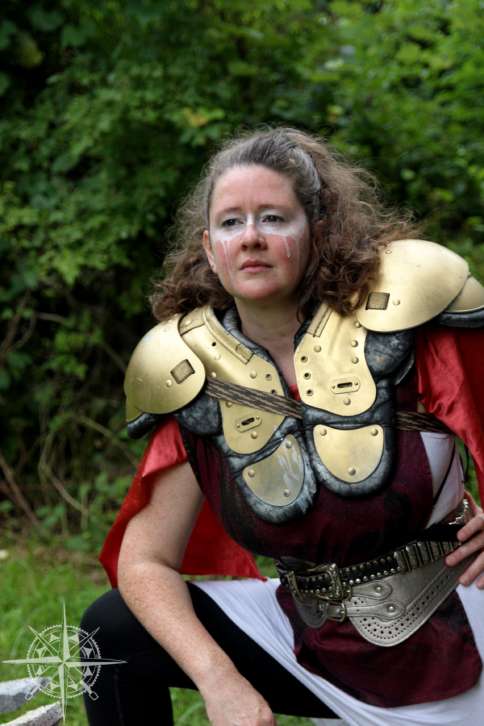 After the summer we had two opportunities to return to our campaign world. At our Adult Retreat we played a prequel that took place in the same world, giving a perspective to characters and storylines from the summer. Many of our staff, having worked over the summer, found themselves getting the chance to play as PCs in earlier storylines that tied into their experiences over the summer. A number of them found this deepened their experience, they already felt connected to the mythology and the chance to build into that world in its early days provided a unique LARP experience for them.
After the summer we had two opportunities to return to our campaign world. At our Adult Retreat we played a prequel that took place in the same world, giving a perspective to characters and storylines from the summer. Many of our staff, having worked over the summer, found themselves getting the chance to play as PCs in earlier storylines that tied into their experiences over the summer. A number of them found this deepened their experience, they already felt connected to the mythology and the chance to build into that world in its early days provided a unique LARP experience for them.
We also returned to this world for our Winter Game, bringing a new problem that arose directly out of choices that the campers made in Games over the summer. Demons arrived, ready to claim the world and lay waste to it, having been given the power to do so inadvertently by a deal the campers had made this summer. Once again the forces of good had to rally to hold off the certain destruction of their world. Before the Adventure began though, I saw campers teaching each other lore and mythology that they had built this summer, telling stories about their characters, helping to ensure that the players who were joining this campaign for the first time would share in that same depth of experience and mythology as the ones who had already been there to be in the world.
Take it directly from Finn, one of our campers who played in all of the Song of the Dead series except for the adult retreat, “I had a fantastic time playing the three Song of the Dead games, each addition to the trilogy adding a unique level of depth to the world that I already knew and loved. Being able to play on the same PC team numerous times gave us the time to add our own little details, like a few words of a language, and it was really cool to see the new players of that same group change up bits and pieces and use it as their own! (OSIMALNI HOO HOO HOO)”
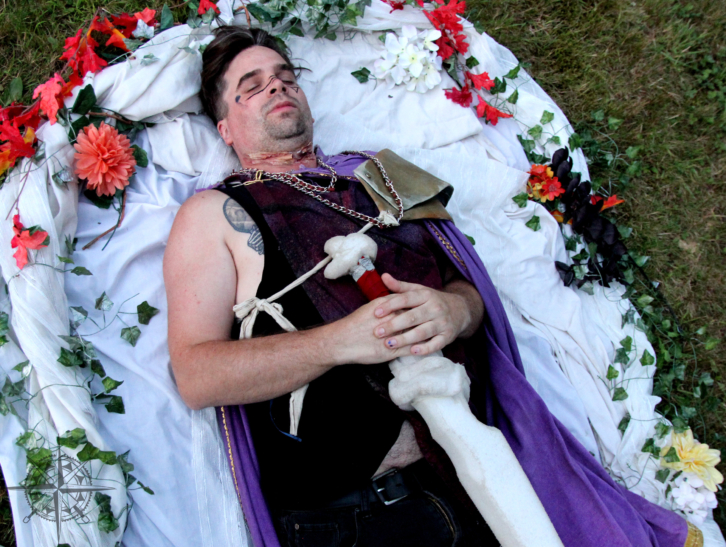 This summer we will be having two more linked games. Building out these games is a fun design challenge. We have to craft two games that are stand alone stories, but played together they show a full story arc, and as with all of our Adventure Games, the storyline that we play wraps up, the campaign does not stretch forward forever. It is a hallmark of our Adventure Games that we build these worlds and these characters, inhabit them, and continue into the next story. This summer at our first two weeks of Overnight Camp we will be playing linked games and hope to see you there! What will you build with us? Where does your story lead?
This summer we will be having two more linked games. Building out these games is a fun design challenge. We have to craft two games that are stand alone stories, but played together they show a full story arc, and as with all of our Adventure Games, the storyline that we play wraps up, the campaign does not stretch forward forever. It is a hallmark of our Adventure Games that we build these worlds and these characters, inhabit them, and continue into the next story. This summer at our first two weeks of Overnight Camp we will be playing linked games and hope to see you there! What will you build with us? Where does your story lead?
Written by Judson Easton Packard. Jan. 2024
